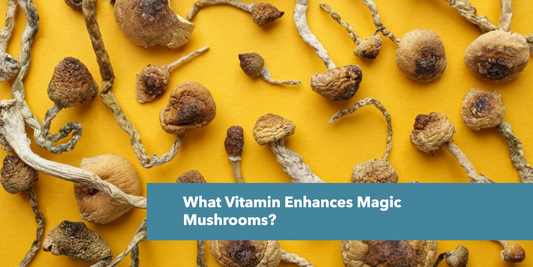What are the Therapeutic Uses of Psilocybin?
Psilocybin, the psychoactive compound found in certain mushrooms, is showing significant promise as a therapeutic agent for a range of mental health conditions. While research is still in its early stages, the potential benefits are promising.
Potential Therapeutic Uses:
Depression: Psilocybin-assisted therapy has shown remarkable results in treating depression, especially treatment-resistant depression.
Anxiety: It has been explored as a treatment for anxiety disorders, including generalized anxiety disorder and social anxiety.
Substance Abuse: Psilocybin therapy shows promise in treating addictions to substances like alcohol, tobacco, and cocaine.
PTSD: There's growing interest in using psilocybin to alleviate symptoms of post-traumatic stress disorder.
End-of-Life Anxiety: Psilocybin may help individuals cope with anxiety and fear related to terminal illness.
Eating Disorders: Some preliminary research suggests potential benefits for treating eating disorders like anorexia nervosa.
Depression
How effective is psilocybin-assisted therapy in treating treatment-resistant depression?
Psilocybin-assisted therapy has shown promising results in treating treatment-resistant depression (TRD). This condition, characterized by a lack of response to standard antidepressant medications, affects a significant number of people.
Rapid and sustained relief: Many patients experience a significant reduction in depressive symptoms shortly after psilocybin-assisted therapy, and these improvements often persist for several months.
Are there any specific patient profiles that would benefit most from psilocybin treatment for depression?
While research is ongoing, certain patient profiles may be particularly suitable for psilocybin-assisted therapy for depression:
Treatment-resistant depression: Individuals who have not responded to multiple antidepressant medications or other conventional treatments.
Chronic or recurrent depression: Patients with a history of long-term or recurring depressive episodes.
Anhedonia: Individuals experiencing a significant loss of interest or pleasure in activities they once enjoyed.
Suicidal ideation: While not a primary treatment for suicidal crisis, psilocybin therapy might be considered for patients with persistent suicidal thoughts after other interventions have failed.
Openness to new experiences: Patients who are open to trying new approaches to treatment and willing to engage in the therapeutic process.
How does psilocybin therapy compare to traditional antidepressant medications in treating depression?
Psilocybin therapy and traditional antidepressant medications represent distinct approaches to treating depression.
Traditional Antidepressants
Mechanism of action: Primarily target neurotransmitter systems (e.g., serotonin, norepinephrine) to balance brain chemistry.
Onset of effect: Gradual, often taking weeks to achieve therapeutic benefits.
Treatment duration: Typically long-term, often requiring continuous medication.
Side effects: Common side effects include weight gain, sexual dysfunction, and insomnia.
Psilocybin Therapy
Mechanism of action: Works through a combination of psychedelic experience and psychotherapy, inducing neuroplasticity and potentially altering negative thought patterns.
Onset of effect: Rapid, with potential for significant symptom reduction after a single or few sessions.
Treatment duration: Typically involves a limited number of sessions.
Side effects: Primarily acute, such as anxiety or nausea, and generally subside within a few hours.
Anxiety
Can psilocybin therapy be used to treat specific anxiety disorders, such as social anxiety or generalized anxiety disorder?
Yes, psilocybin therapy shows promise in treating specific anxiety disorders, including social anxiety and generalized anxiety disorder.
While research is still in its early stages, initial studies have shown encouraging results. The underlying theory is that psilocybin can help individuals reframe their relationship with anxiety, allowing them to develop new coping mechanisms and perspectives.
How many psilocybin therapy sessions are typically needed to treat anxiety disorders?
Typically, two to three psilocybin-assisted therapy sessions are administered for treating anxiety disorders.
Can psilocybin therapy be combined with other anxiety treatments for optimal results?
Yes, psilocybin therapy can be combined with other anxiety treatments for optimal results. In fact, a comprehensive treatment plan often involves a multimodal approach.
Psilocybin therapy and psychotherapy: This combination is often used, with psychotherapy providing support before, during, and after the psychedelic experience.
Psilocybin therapy and medication: For some individuals, continuing medication while undergoing psilocybin therapy might be beneficial, especially in cases of severe or chronic anxiety.
Psilocybin therapy and lifestyle modifications: Incorporating stress management techniques, regular exercise, and a healthy diet can enhance the effects of psilocybin therapy.
Substance Abuse
Which substances is psilocybin therapy most effective in treating addiction to?
Psilocybin therapy shows promising potential in treating various addictions including alcohol tobacco and Opioids.
How does psilocybin therapy work to reduce cravings and relapse rates in substance abuse?
Psilocybin therapy appears to reduce cravings and relapse rates in substance abuse through several potential mechanisms:
Altered consciousness: The psychedelic experience can provide a new perspective on addictive behaviors, challenging ingrained patterns and thought processes.
Reduced emotional reactivity: Psilocybin may help individuals manage the emotional triggers that often lead to substance use, reducing the intensity of cravings.
Increased self-awareness: The psychedelic experience can foster self-reflection and insight into the underlying reasons for addiction, leading to a greater understanding of one's behavior.
Neuroplasticity: Psilocybin may promote neuroplasticity, allowing the brain to form new connections and break free from addiction-related neural pathways.
Can psilocybin therapy be used as a standalone treatment or is it most effective in combination with other therapies?
Psilocybin therapy is most effective when combined with psychotherapy. While the psychedelic experience itself can be transformative, the integration of these insights and the development of coping strategies require guidance from a trained therapist.
What are the long-term outcomes of psilocybin therapy for substance abuse?
Many individuals report significant reductions in substance use, with some achieving long-term abstinence.
Improved quality of life: Beyond reduced substance use, participants often report improvements in overall well-being, including increased life satisfaction and reduced anxiety and depression.
PTSD
How can psilocybin therapy help individuals with PTSD process traumatic memories?
Psilocybin therapy can potentially help individuals with PTSD process traumatic memories in several ways including Accessing suppressed memories, Emotional processing, Reframing narratives, and Neuroplasticity.
What is the role of therapy in conjunction with psilocybin treatment for PTSD?
Therapy is an integral component of psilocybin treatment for PTSD. It provides essential support before, during, and after the psychedelic experience.
Therapists help patients understand the psychedelic experience, manage expectations, and develop coping strategies. Therapists guide patients in processing the insights and emotions experienced during the psychedelic session, helping them integrate these experiences into their lives.
Therapy provides a safe space for patients to explore and process traumatic memories, develop new coping mechanisms, and challenge negative thought patterns. Therapists offer strategies for managing PTSD symptoms, such as hypervigilance, flashbacks, and avoidance behaviors.
Are there specific types of PTSD that may respond better to psilocybin therapy?
While research is still in its early stages, there's potential for psilocybin therapy to benefit various types of PTSD. However, specific data on the efficacy of psilocybin for particular PTSD subtypes is limited.
End-of-Life Anxiety
Can psilocybin therapy help patients with terminal illnesses cope with fear of death?
Yes, psilocybin therapy has shown promise in helping patients with terminal illnesses cope with the fear of death.
The psychedelic experience can offer a profound shift in perspective, allowing individuals to confront their mortality with greater acceptance and peace. Key benefits include:
- Reduced anxiety and depression
- Increased sense of meaning and purpose
- Expanded consciousness
How does psilocybin therapy impact quality of life for patients with terminal illnesses?
Psilocybin therapy has shown significant potential in improving the quality of life for patients with terminal illnesses.
By addressing the psychological and emotional challenges associated with a terminal diagnosis, psilocybin therapy can
- Reduce anxiety and depression
- Increase sense of peace and acceptance
- Deepen connections with loved ones
- Enhance spiritual well-being
- Improve pain management
What is the Role of the Therapist in Psilocybin-Assisted Therapy for End-of-Life Anxiety?
The therapist prepares the patient for the psychedelic experience, addressing concerns, expectations, and potential challenges. This involves building trust and rapport with the patient. The therapist creates a safe and supportive environment during the psilocybin session, offering guidance and reassurance as needed.
After the session, the therapist helps the patient process the experience, integrating insights and coping mechanisms into daily life. The therapist addresses any ongoing anxiety or other symptoms, providing coping strategies and emotional support. The therapist can help patients explore their end-of-life wishes, values, and legacy, providing guidance and support in making difficult decisions.
Eating Disorders
How does psilocybin therapy show promise in treating eating disorders like anorexia nervosa?
Psilocybin therapy shows promising potential in treating anorexia nervosa. This eating disorder is notoriously difficult to treat, with limited treatment options available.
Challenging distorted body image
Reducing anxiety and depression
Increasing cognitive flexibility
What are the potential mechanisms by which psilocybin may help with eating disorders?
Psilocybin's potential to treat eating disorders is a promising area of research. While the exact mechanisms are still being explored, several potential pathways have been identified
Altered perception of body image: Psilocybin can induce a shift in perspective, potentially challenging distorted body image and self-perception.
Increased cognitive flexibility: Rigid thinking is a hallmark of eating disorders. Psilocybin may promote cognitive flexibility, allowing individuals to consider alternative perspectives and behaviors.
Reduced anxiety and depression: These are common comorbidities of eating disorders, and psilocybin has shown efficacy in treating both.
Trauma processing: Many individuals with eating disorders have experienced trauma, and psilocybin-assisted therapy can facilitate the processing of these traumatic memories.
Normalization of reward processing: Eating disorders can disrupt the brain's reward system. Psilocybin may help normalize reward processing, reducing the compulsion to engage in disordered eating behaviors.
What are the safety considerations of using psilocybin to treat eating disorders?
While early research suggests that psilocybin may be well-tolerated in individuals with anorexia nervosa, several safety considerations must be addressed.
Physical health risks: Individuals with anorexia often have underlying physical health issues, such as electrolyte imbalances, cardiac abnormalities, and malnutrition. These conditions can increase the risk of adverse reactions to psilocybin.
Psychological risks: The psychedelic experience can be intense, and individuals with eating disorders may be particularly vulnerable to experiencing anxiety, panic, or psychosis.
Body image concerns: While psilocybin may help challenge distorted body image, it's essential to monitor for potential exacerbation of body image concerns during and after the experience.
Nutritional status: Maintaining adequate nutrition is crucial for individuals with eating disorders. Close monitoring of nutritional intake is necessary during and after psilocybin therapy.
Medical supervision: Due to the potential physical and psychological risks, psilocybin therapy for eating disorders should be conducted under strict medical supervision in a controlled setting.




